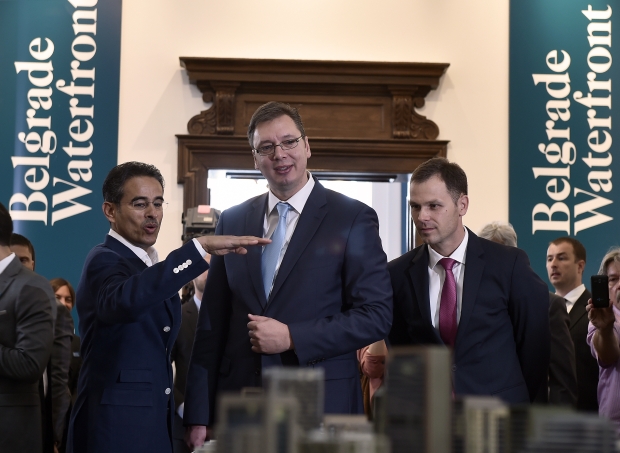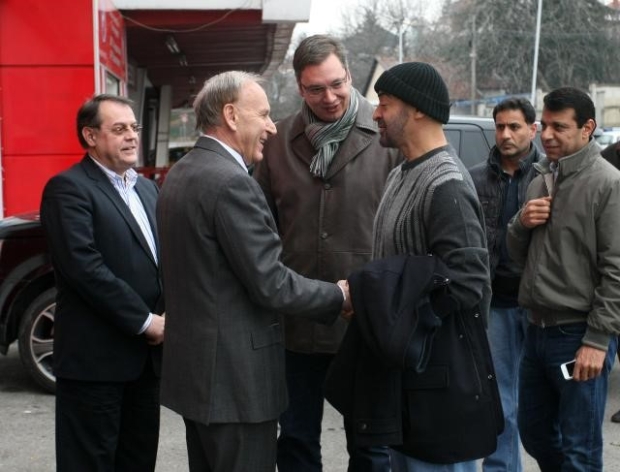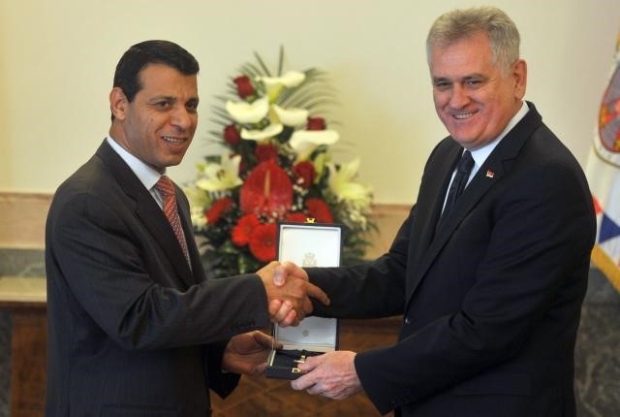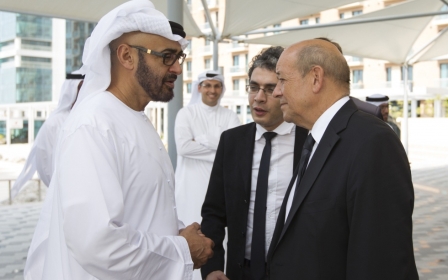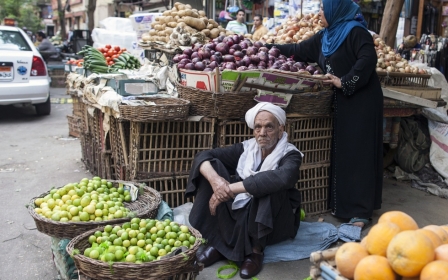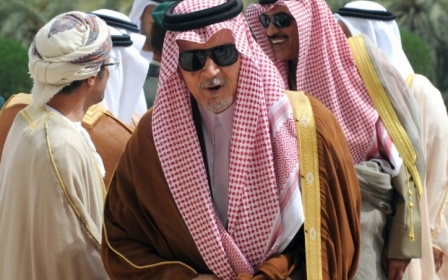The UAE's shadowy dealings in Serbia
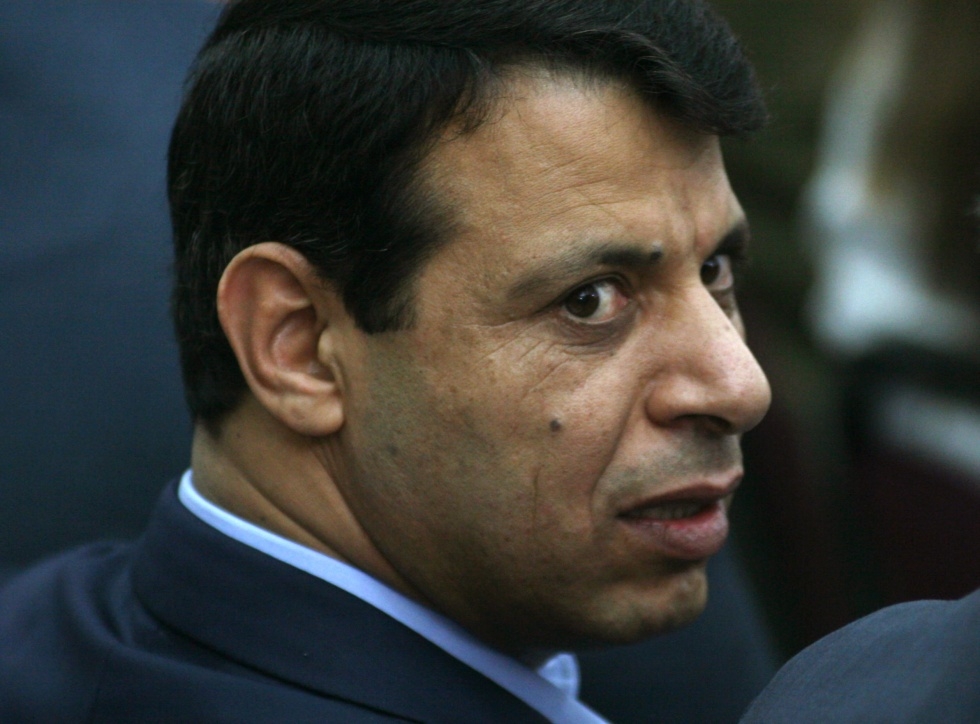
Over the past two years the UAE has invested billions of dollars in Serbia.
The Emirati leadership has agreed lucrative deals to develop the Serbian arms industry; bought a significant stake in its national airline; and handed out multibillion dollar loans to the government.
The reasons for UAE investment in Serbia are shrouded in secrecy, although Serbian sources have revealed to MEE that they go far beyond any potential financial rewards.
The Crown Prince of Abu Dhabi Mohammed bin Zayed al-Nahyan has been accused of acting as a proxy for the US and Israel in Eastern Europe while also attempting to exploit a loosely regulated Serbian arms market to distribute weapons across the Middle East.
Behind the huge investment lies the shadowy figure of exiled Palestinian strongman Mohammed Dahlan. He is said to be at the centre of a web facilitating communication between the UAE with American and Israeli intelligence figures while also aiding corrupt Emirati investments in Serbia that have lined the pockets of their political leaders.
UAE investments in Serbia
An agreement worth up to $200mn was signed between the Serbian arms company Yugoimport SDPR and the UAE’s Emirates Advanced Research and Technology Holding (EARTH) at the International Defence Exhibition in Abu Dhabi last year.
A source in Serbia told MEE the investment relates to the Serbian missile system ALAS (Advanced Light Attack System), which is a “multipurpose anti-armour weapon with effective range up to 60km”. The source said the UAE is interested in these missiles because “they should be able to destroy all existing models of tanks in the world”.
The UAE is the fourth largest arms importer in the world, according to the Stockholm International Peace Research Institute, and spent over $19bn on military equipment in 2012. With a national population of fewer than one million the UAE, in terms of arms per capita, is now widely viewed as being the most heavily armed nation on the planet.
The UAE-Serbian defence relationship is becoming increasingly close, according to the Serbian source, who said “initial forms of cooperation have been established at the level of military security agencies, military police and special units, and in the fields of information and communication technologies and cyber defence”.
While the source said the UAE is primarily interested in Serbia’s burgeoning defence industry, the Emiratis have also made numerous other investments across several industries.
One of the most prominent deals has been Abu Dhabi’s Etihad Airways buying a 49 percent stake in Serbia’s lossmaking JAT Airways in August 2013. A new company was born out of that investment, Air Serbia, with the stated aim of creating an eastern European transportation sub-hub.
The deal, however, has been criticised as corrupt by a former economic advisor to the Serbian government.
“Etihad provided a credit note, not a direct investment, in the JAT deal that will later be converted to shares,” Dusan Pavlovic, who served as advisor to the Minister of Economy in Serbia from September 2013 to January 2014, told MEE. “The Republic of Serbia is the guarantor of this credit note and if the new company goes bust it is the Serbian people who will have to pay up the 40 million euros.”
“If this were to happen an additional two million euros would have to be paid in legal fees to a company involving people close to the Serbian prime minister,” he added.
Deals involving UAE investments in Serbia are kept secret from the public because of a condition in an agreement signed between the two governments in March 2013, according to Pavlovic.
“This agreement included provisions to overrule some domestic law in Serbia. For example, any investment that comes from the UAE is given priority over local deals,” he said.
“The agreement for UAE investments in Serbia stipulates that the details of all deals must remain secret.”
Pavlovic slammed many of the most high-profile Emirati investments and criticised the Serbian government for lying to their people.
He described a proposed multibillion dollar property investment by the Emiratis in Belgrade as “totally absurd”, saying “there simply isn’t the market for luxury apartments” in a country as poor as Serbia.
He criticised the sale of agricultural land to the UAE worth hundreds of millions of dollars as preventing local Serbians from accessing huge farming areas, condemning the government’s claim that the land was derelict as a “complete lie”.
Reasons behind UAE involvement in Serbia
Serbian officials have proudly proclaimed the UAE interest in Serbia as evidence of the country emerging as a key regional player.
“The UAE believes in the political stability of Serbia, in our human capital and it [the investment] is the result of friendship and understanding between [Serbian Prime Minister] Aleksandar Vucic and Sheikh Mohammed [bin Zayed the Crown Prince of Abu Dhabi],” Sinisa Mali, economic advisor to the prime minister and candidate for the mayor of Belgrade, told Bloomberg in March this year.
While there is understood to be good personal relationships between Serbian and Emirati leaders, MEE’s Serbian sources have said geostrategic goals lie behind the UAE’s involvement in Serbia.
“The UAE may be using its close ties and investment strategies in Serbia to thwart its rival Turkey from establishing a firm foothold and spreading its economic and geopolitical influence in the Balkans,” the source told MEE. “The strategic positioning of the UAE against Turkish regional influence in the Balkans is probably the main underlying reasons for strategic cooperation between the UAE and Serbia.”
“This is probably done on the advice of the US and Israel.”
The source said the Serbians are naturally keen to counter any Turkish influence in the Balkans due to “fears Turkey may later use their power to recolonize Serbia”.
Analysts have said that Serbia is openly hostile to Turkey, pointing to their cancelling of a trilateral meeting with Turkey and Bosnia last year.
“One should keep in mind that orthodox Serbia was never too keen on Turkey’s renewed influence in the Balkans, unlike predominantly Muslim Bosnia,” Vladimir Pekic, a Serbian journalist and analyst, told MEE.
Pekic also suggested that the UAE may be investing in Serbia’s defence industry in order to counter Russian influence in the Balkans.
“What might be possible as well is that the UAE is finding a way of employing Serbia’s defence industry – as Serbia is a country that refuses to join NATO – in a way that is seen as favourable by the US and EU,” he said. “Serbia is constantly balancing between the EU and Russia in its foreign policy and the West may be keen to prevent Serbia from aligning itself too much with Vladimir Putin’s Russia in the defence sector.”
It isn’t just political manoeuvring in the Balkans that is driving UAE interest in Serbia, however, with investment in the Serbian defence industry a potential route to amplifying their power within the Middle East, according to senior banking figures.
“Last year in Belgrade I was told by a government official that the UAE want to source arms supplies to give to their ‘friends’ in the region,” Timothy Ash, head of emerging markets at Standard Bank, told MEE. “Serbia has a large arms industry and a lot of surplus military equipment. Obviously there is a market in the Middle East for high quality kit.”
“There is a very sophisticated arms sector in Serbia, with far more flexible arms export rules, and the UAE are taking advantage of that,” he added.
The UAE has run into trouble in the past for re-exporting arms in the Middle East. In 2012 Switzerland briefly suspended all arms export licenses to Abu Dhabi after reports emerged that Swiss-manufactured hand grenades, sold to the Emiratis, had been found in the hands of rebel groups in Syria.
The Swiss lifted the ban after UAE officials “assured…in writing that apart from the hand grenades, no other war material imported from Switzerland has been re-exported.”
Another area of controversy in the UAE arms industry has involved the Crown Prince of Abu Dhabi himself. The New York Times revealed in 2011 that Sheikh Mohammed had charged Erik Prince, founder of Blackwater Worldwide, with establishing a private mercenary army for the crown prince.
The army was established for various reasons, including “to put down internal revolts” in the UAE. Prince has recruited hundreds of Columbian mercenaries to the army, avoiding the hire of any Muslims as they “could not be counted on to kill fellow Muslims”.
The opportunity to explore a new arms market that is loosely regulated is clearly a draw for the UAE, Standard Bank’s Ash explained, going on to state that while the Kosovo war had caused issues in the Serbian-Emirati relationship these problems have been resolved by politicians able to see mutual benefit in restoring positive ties.
“Former Yugoslavia has historically close ties into the Middle East so there are a lot of long-dated relationships there and [Prime Minister] Vucic has taken advantage of that,” he said. “He’s cultivated those relationships and for Abu Dhabi there is the opportunity to build some nice investment opportunities.”
Mohamed Dahlan: the UAE fixer
Aleksandar Vucic was elected as prime minister of Serbia in April this year. He was previously known for his vitriolic hatred of Muslims, in 1995 he is reported as having said that Serbia “would kill 100 Muslims for every Serb who died” during the civil war.
Vucic now enjoys what he described as a “close personal friendship” with Sheikh Mohammed of Abu Dhabi.
This friendship and subsequent heavy UAE investment in Serbia was only possible because of one man: Mohammed Dahlan.
Dahlan, the former Palestinian spy chief in Gaza, has been living in exile in the UAE since he was chased out of the West Bank in June 2011. Palestinian President Mahmoud Abbas has accused him of financial embezzlement and acting as an Israeli agent involved in assassination attempts on the late Yasser Arafat.
He is now widely reported as serving as a security advisor to Sheikh Mohammed in Abu Dhabi.
Dahlan was the linchpin in improving ties between Serbia and the UAE in 2012, after relations had soured four years earlier when the Emiratis became the first Arab country to recognise Kosovo as an independent and legitimate state.
Dahlan’s mediation role hinged on his own interests in Eastern Europe, which centre on Montenegro. He was given Montenegrin citizenship in 2012, despite what Serbian analyst Pekic describes as “a very restrictive policy” that does not allow double citizenship.
Montenegrin officials have not disclosed why they gave Dahlan citizenship, but MEE’s Serbian source has suggested it could be to do with his lucrative business dealings in Montenegro, claiming “there is strong evidence Dahlan has used Montenegro to launder Palestinian money he has embezzled”.
Dahlan has numerous companies registered in Montenegro including the Levant International Incorporation, which is registered for consulting and management, and Manarah Holding, established for developing real estate projects.
There are no publicly available details about the financial dealings of these companies, although The Richest website, which calculates the wealth of public figures, has estimated Dahlan’s net worth to be in the region of $120mn.
Mohammad Rashid seems to be Dahlan’s key partner in Montenegro, appearing on the business registry of at least four of his companies. Rashid is a Kurd from Iraq who was formerly an economic advisor to Yasser Arafat.
Rashid has several companies registered in Montenegro and has received loans amounting to 13 million euros from the Djukanovic brothers, one of who, Milo, is the Montenegrin prime minister.
One of his companies, Monte Mena Investments, is also registered in Panama where his partner, according to a Serbian source, is Egyptian billionaire Samih Sawiris. In 2011 Sawiris obtained Montenegrin citizenship and is reported to be planning a billion euro investment in Montenegro’s Lustica peninsula.
Dahlan is said to have used his Montenegrin connections to facilitate a visit by Prime Minister Milo Djukanovic to the UAE last year. Serbian Prime Minister Vucic later referred to that visit as being key to improving his own previously sour relations with Montenegro when he said: “we were very pleased when Djukanovic said a few nice words about Serbia in his talks with UAE officials. He was decent enough to advise them to invest in Serbia’s defence industry.”
That advice is what led to the UAE investments in Serbia’s weapons industry in recent months.
In April 2013 the Serbian President Tomislav Nikolic – a key Vucic ally in Serbia – awarded Dahlan with the Medal of the Serbian Flag “for his contribution to peaceful cooperation and friendly relations between Serbia and the UAE”.
Dahlan could also be called upon to give advice on the arms trade as he himself is said to have experience of covertly working within it. He is accused by the Palestinian Fatah Party of being involved in shipping Israeli made arms to former Libyan leader Muammar Gaddafi. He has connections to Libya, as revealed by a WikiLeaks cable from 2010 that detailed a meeting he held in Spain with Gaddafi’s son Saif.
As well as aiding the UAE’s investments in Serbian arms, Dahlan could also be playing a key role in the alleged Emirati goal of fulfilling American and Israeli interests in Eastern Europe. A Serbian intelligence source, who asked to remain anonymous, told MEE that Dahlan has a “warm relationship” with former CIA Director George Tenet and “ties” to Amnon Shahak from the Israeli army and Yaakov Perry from Mossad.
The source said that Dahlan has connections to exposed Israeli agents in Eastern Europe too, through the Palestinian Adnan Yasin who is currently living in the Bosnian capital Sarajevo. Yasin is a former employee of the Palestinian Liberation Organisation who was arrested in Tunisia in 1993 after French security agencies “expressed concern at his activities”.
Yasin is reported as having confessed to working for Mossad in 1991.
The UAE itself has direct dealings with Israel, according to the Intelligence Online website. A report in 2012 stated that “trade between the two countries, principally in the area of security, amounted to nearly $300mn last year [2011].”
While Israel does not have an official presence in the Gulf it recently opened a “virtual embassy” on Twitter, in order to promote “dialogue with the people of the GCC region”.
Gulf monarchs are particularly sensitive to being publicly linked with Israel. Last month Saudi Arabia’s ambassador to the UK released a statement refuting claims his country, along with Egypt, were coordinating with Israel over a deadly assault on Gaza that has left nearly 2,000 Palestinians dead.
News of the UAE’s shadowy dealings in Serbia and the key role played by Mohammed Dahlan will do little to help the Gulf States in their struggle to keep dealings with Israel a secret.
As for the powerful Sheikh Mohammed bin Zayed he has described his relationship with Serbia in ambiguous terms. He has praised the “honesty of Serbian friends” and stated: “We [the UAE] believe in Serbia, we believe in our friendship.”
Due to the secretive nature of the UAE’s bilateral agreement with Serbia it is impossible to say with certainty what the goals of this relationship are. It is clear, however, that for some analysts at least, there is far more than meets the eye when it comes to the Emiratis newfound love affair with Eastern Europe.
New MEE newsletter: Jerusalem Dispatch
Sign up to get the latest insights and analysis on Israel-Palestine, alongside Turkey Unpacked and other MEE newsletters
Middle East Eye delivers independent and unrivalled coverage and analysis of the Middle East, North Africa and beyond. To learn more about republishing this content and the associated fees, please fill out this form. More about MEE can be found here.


